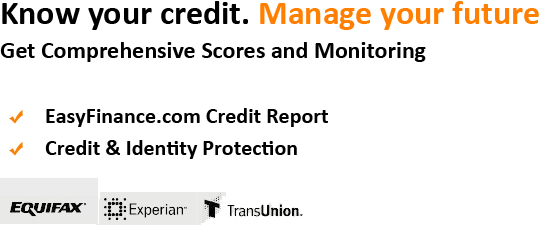Factors that Affect Credit Scores
Factors That Affect Credit Scores and How EasyFinance Can Help You Improve Them
Your credit score is one of the most important numbers in your financial life. It determines whether you can qualify for a loan, the interest rates you receive, and even the types of credit cards you can get approved for. While many people know they have a credit score, fewer understand exactly what influences it—and how they can take control. EasyFinance.com, a BBB accredited business, not only helps consumers connect with top online lenders but also partners with credit score and ID theft protection services to help you manage and protect your financial profile. By learning which factors matter most, you can make smart moves to improve your score and increase your chances of loan approval, even if you need quick funding.
Payment History and Why It Matters Most
Your payment history makes up the largest portion of your credit score, accounting for around 35% of the total. Lenders want to see that you consistently pay your bills on time. Just one missed payment can lower your score significantly and stay on your credit report for years. This is why making timely payments is essential for maintaining good credit. If you are struggling with multiple bills and fear a missed payment could hurt your score, short-term funding might help. In urgent cases, products like i need $500 dollars now no credit check loans can help you cover obligations while protecting your credit history.

Credit Utilization and How to Keep It in Check
Credit utilization—the percentage of your available credit that you are currently using—plays a key role in your score. Most experts recommend keeping utilization under 30%, but lower is better. High utilization signals risk to lenders, even if you make all payments on time. If your balances are climbing, consider paying them down quickly or consolidating them. Some borrowers turn to solutions like loans bad credit guaranteed approval to consolidate high-interest credit card debt into a single, more manageable payment. This can lower utilization and help improve your score over time.
Length of Credit History and Why Patience Pays Off
The longer your credit accounts have been active, the better it is for your score. This factor measures both the age of your oldest account and the average age of all your accounts. Closing older accounts can lower your average account age, so it’s often better to keep them open, even if you don’t use them frequently. If you’re just starting to build credit or have limited history, focusing on responsible usage of a small line of credit or even a secured credit card can help establish a positive track record. For individuals who need quick financial resources while building credit, options such as 500 dollar loan no credit check can provide short-term funding without requiring a long-established history.
Credit Mix and the Value of Variety
Lenders like to see a healthy mix of different credit types—such as credit cards, installment loans, and mortgages—because it shows you can manage various forms of debt responsibly. While this factor doesn’t carry as much weight as payment history or utilization, it can still influence your score. If your credit mix is limited, adding an installment loan could help diversify it. EasyFinance.com partners with lenders that offer online loans no credit check for borrowers seeking quick access to funds while strengthening their credit profile.
New Credit and the Impact of Hard Inquiries
Every time you apply for new credit, a lender performs a hard inquiry on your report. While a single inquiry may have a minimal impact, multiple inquiries in a short period can lower your score and signal higher risk to lenders. If you’re planning a major loan application, such as a mortgage or auto loan, try to avoid unnecessary applications beforehand. However, if you need immediate cash for an urgent expense, you can still explore fast funding options like $255 payday loans online same day to bridge the gap without adding excessive inquiries from multiple lenders.
The Role of Credit Monitoring and ID Theft Protection
Even the most responsible borrower can see their credit score drop due to fraud or identity theft. This is why monitoring your credit and protecting your personal information is vital. EasyFinance.com works with credit score monitoring and theft ID protection partners to help you safeguard your data and detect unauthorized activity early. If your credit has been affected by fraudulent accounts or hard inquiries you didn’t authorize, restoring your score takes time, but having access to emergency funds like 1000 loan no credit check can help you manage immediate expenses while you work to resolve the issue.
How EasyFinance.com Supports Borrowers with All Credit Profiles
Whether your credit is excellent, average, or needs significant improvement, EasyFinance.com connects you with the right lenders for your situation. Our platform is designed to help you compare offers, understand terms, and secure funding that fits your needs. From quick cash advances to larger installment loans, we help customers get the best possible online loan offers on the market, while also supporting long-term financial health. Even if you’re in a difficult spot and simply need money now, we can guide you to safe, reputable lenders.

How Your Credit Score Affects Loan Interest Rates
One of the most direct ways your credit score impacts your finances is through the interest rates you receive on loans. A higher score often leads to lower rates, saving you money over time. Conversely, a lower score typically results in higher rates, increasing the cost of borrowing. For example, borrowers with excellent credit might qualify for a 6% interest rate on a personal loan, while those with poor credit could face rates above 20%. This difference can mean thousands of dollars over the life of a loan. If you need to borrow while working to improve your score, short-term products like payday loans no credit check can provide temporary relief without locking you into long-term, high-cost commitments.
Using Loans Strategically to Build Credit
Not all borrowing is bad for your credit. When used strategically, loans can help you establish or rebuild credit by adding positive payment history, reducing credit utilization, and diversifying your credit mix. The key is borrowing only what you can afford to repay and making every payment on time. For instance, a small installment loan or even a short-term loan from EasyFinance’s trusted network can be a stepping stone toward stronger credit. In urgent cases, some borrowers choose options like i need 1000 dollars now to cover pressing needs while using the opportunity to demonstrate responsible repayment.
Key Insights
-
Payment history is the single most important factor in your credit score, making on-time payments essential.
-
High credit utilization can lower your score even if you never miss a payment.
-
Length of credit history improves over time, so keeping older accounts open can help.
-
Credit mix adds value by showing lenders you can handle different types of debt.
-
Too many hard inquiries can hurt your score, so apply for credit strategically.
-
Credit monitoring and ID theft protection are essential to safeguard your score.
-
EasyFinance.com offers access to a wide range of loan options, including fast, no-credit-check loans, to meet both urgent and long-term financial needs.
FAQ
What is the fastest way to improve my credit score?
The quickest methods include paying down high balances, making all payments on time, and disputing any errors on your credit report.
Can I get a loan with bad credit?
Yes. EasyFinance.com connects borrowers with lenders offering options for various credit profiles, including those with poor credit.
Does applying for a loan always lower my credit score?
Hard inquiries can temporarily lower your score, but the impact is usually small unless you apply for multiple loans in a short period.
Can short-term loans help my credit?
If repaid on time, short-term loans can add positive payment history to your report, which can help improve your score over time.
How often should I check my credit report?
At least once a year, but monthly monitoring is ideal if you’re actively working to improve or protect your score.






